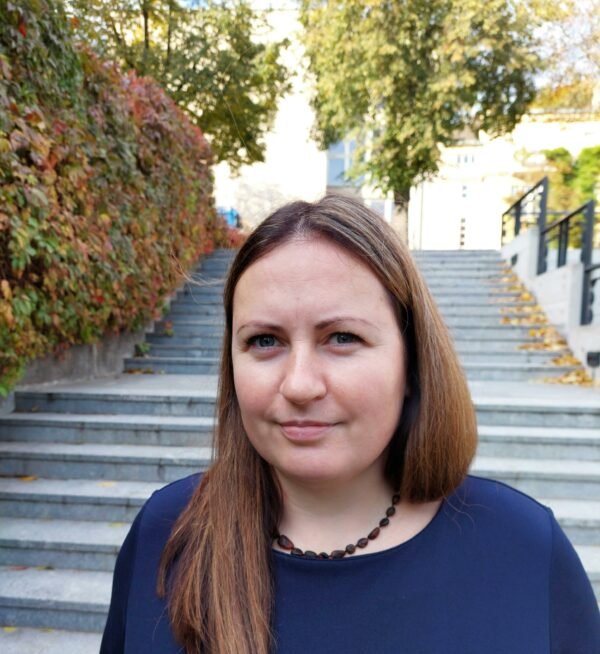Last season of WGT was a great example of how determination and motivation can help to achieve any goal! Our mentee Inga had worked in supply management for around a decade, but this didn’t stop her from realising the old dream to do more tech-related activities. Currently, she’s the Data Scientist in one of the largest financial institutions in Lithuania. But what has her journey looked like?
What did your career path look like before discovering tech?

After graduating from high school, I enrolled in the university of applied sciences. I always loved numbers (Mathematics and Chemistry were my favourite subjects), so accounting was my choice there. However, I decided to pause my studies and move abroad after a year.
A few years later, I returned to Lithuania to start another study program and my career path at the same time. So I became a supply manager responsible for maintaining inventory database, purchasing orders, searching for new suppliers, negotiating and networking with suppliers and partners. At the same time, I started my undergraduate studies in Economics at Kaunas University of Technology.
After graduating, I felt the need to change jobs, but didn’t know what would be the right fit. I kept receiving interview invitations, but probably didn’t want to slip out of my comfort zone to change anything.
“ I was panicking in the first term because I hadn’t heard of any programming languages. I had to learn everything at once, but I enjoyed it and successfully completed my studies.“
When and why did you decide that it would be the right time for changes?
4 years ago, I suffered a spinal cord injury, followed by a long period of rehabilitation. It forced me to think about what I would like to do in the future. Eventually this led me to the postgraduate studies of Big Business Data Analytics. However, when the start of the school year came, I realized that the course was really demanding. My program covered three areas: Mathematics, Computer Science, and Economics. I was panicking in the first term because I hadn’t heard of any programming languages. I had to learn everything at once, but I enjoyed it and successfully completed my studies.
Why did the world of tech become your next step?
There isn’t one right answer to this question. Maybe it was my passion for Mathematics. Maybe it was my time in bachelor studies as I spent 2 final years extensively working with data analysis and identified some knowledge gaps along with various tools. I had no idea back then. Also, my postgraduate studies enriched my tech knowledge, and I realised that there are many areas where I could apply my data analytics skills.
“ I was even questioning myself what I was doing there and whether I really needed it. However, my own motivation and support from my family, coursemates and lecturers allowed me to overcome any difficulties.”

What were your steps and challenges to achieve this goal?
Although related studies aren’t necessarily a prerequisite to enter the world of tech, I decided to focus on my postgraduate degree. It was challenging for many reasons from learning many new things to giving up my job and thus having financial difficulties. Also, I started my Masters over 30, and most of the people in my course were younger. Sometimes studying was really hard: I was even questioning myself what I was doing there and whether I really needed it. However, my own motivation and support from my family, coursemates and lecturers allowed me to overcome any difficulties.
Why did you decide to participate in Women Go Tech?
I tried to get into this program a few times, but I always had the same goal: to find the right role in tech eventually.
“The most important thing I got from my mentor was improved self-confidence.”
How did you realise this goal when you became the mentee of WGT?
Everything happened step by step. My mentor provided a lot of help in polishing my CV and LinkedIn profile. During every catchup, we discussed potential job interview questions. But the most important thing I got from my mentor was improved self-confidence.
“It’s my 2nd month as a Data Scientist. It’s difficult, but very interesting at the same time.“
Where are you now in this career journey?
It’s my 2nd month as a Data Scientist. It’s difficult, but very interesting at the same time. My team is great, as they transform every struggle into opportunity. All in all, I really enjoy it.
What’s more, I just received an offer to join one creative tech academy as a children mentor. This excites me because I will have a chance to support children during their explorations in tech.
What do the specialists of your area do and what do you like the most there?
My current role includes, but are not limited to these:
- Maintenance and development of models and algorithms, incl. data preparation, methodology design, and technical implementation
- Data analysis, interpretation, and usage in modelling
- Presentation of findings to relevant stakeholders
- Providing expertise and insight to stakeholde
I can apply a very wide set of skills and knowledge: mathematical thinking, coding, economics-related background… Most importantly, this job isn’t dull and I can explore new things every day.
“Even if you fail, look at the bright side of any situation.“
What is your advice to other women, aiming to change their careers?
Even if you fail, look at the bright side of any situation. There are many small details which can make any failure beneficial for you! For example, after a few job rejections, I attended all interviews with determination and ambition. Actually, job interviews are very useful even if you don’t make it to the next stage. But the key thing is to consider how takeaways from these failures can work out in the future.
